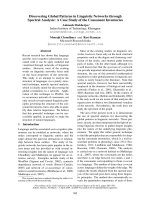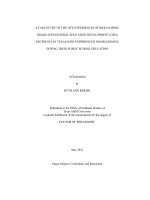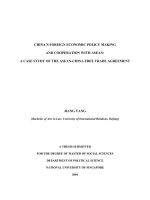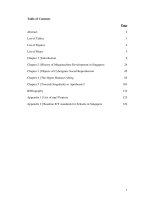NEEDS AND PROBLEMS IN ENGLISH LISTENING AND SPEAKING SKILLS: A CASE STUDY OF THE METROPOLITAN POLICE OFFICERS AT COUNTER SERVICE AT CHANA SONGKRAM POLICE STATION pot
Bạn đang xem bản rút gọn của tài liệu. Xem và tải ngay bản đầy đủ của tài liệu tại đây (440.96 KB, 100 trang )
NEEDS AND PROBLEMS IN ENGLISH LISTENING AND SPEAKING SKILLS:
A CASE STUDY OF THE METROPOLITAN POLICE OFFICERS
AT COUNTER SERVICE AT CHANA SONGKRAM POLICE STATION
MASTER’S PROJECT
BY
SUTHEE KHAMKAEW
Presented in Partial Fulfillment of the Requirements for the
Master of Arts Degree in Business English for International Communication
at Srinakharinwirot University
September 2009
NEEDS AND PROBLEMS IN ENGLISH LISTENING AND SPEAKING SKILLS:
A CASE STUDY OF THE METROPOLITAN POLICE OFFICERS
AT COUNTER SERVICE AT CHANA SONGKRAM POLICE STATION
MASTER’S PROJECT
BY
SUTHEE KHAMKAEW
Presented in Partial Fulfillment of the Requirements for the
Master of Arts Degree in Business English for International Communication
at Srinakharinwirot University
September 2009
Copyright 2009 by Srinakharinwirot University
ความตองการและปญหาการใชภาษาอังกฤษดานทักษะการฟงและพูด
กรณีศึกษาของตํารวจนครบาล ณ ศูนยบริการประชาชนและนักทองเที่ยว
สถานีตํารวจชนะสงคราม
บทคัดยอ
ของ
สุธีร คําแกว
เสนอตอบัณฑิตวิทยาลัย มหาวิทยาลัยศรีนครินทรวิโรฒ เพื่อเปนสวนหนึ่งของการศึกษา
ตามหลักสูตรปริญญาศิลปศาสตรมหาบัณฑิต
สาขาวิชาภาษาอังกฤษธุรกิจเพื่อการสื่อสารนานาชาติ
กันยายน 2552
NEEDS AND PROBLEMS IN ENGLISH LISTENING AND SPEAKING SKILLS:
A CASE STUDY OF THE METROPOLITAN POLICE OFFICERS
AT COUNTER SERVICE AT CHANA SONGKRAM POLICE STATION
AN ABSTRACT
OF
SUTHEE KHAMKAEW
Presented in Partial Fulfillment of the Requirements for the
Master of Arts Degree in Business English for International Communication
at Srinakharinwirot University
September 2009
NEEDS AND PROBLEMS IN ENGLISH LISTENING AND SPEAKING SKILLS:
A CASE STUDY OF THE METROPOLITAN POLICE OFFICERS
AT COUNTER SERVICE AT CHANA SONGKRAM POLICE STATION
MASTER’S PROJECT
BY
SUTHEE KHAMKAEW
Presented in Partial Fulfillment of the Requirements for the
Master of Arts Degree in Business English for International Communication
at Srinakharinwirot University
September 2009
Suthee Khamkaew. (2009). Needs and Problems in English Listening and Speaking
Skills: A Case Study of the Metropolitan Police Officers at Counter Service at
Chana Songkram Police Station. Master’s Project M.A. (Business English for
International Communication). Bangkok: Graduate School Srinakharinwirot
University. Project Advisor: Dr. U-maporn Kardkarnklai.
This study explored needs and problems in English listening and speaking skills
of the Metropolitan Police Officers (MPOs) working at counter service at Chana Songkram
Police Station. The instruments used in this study were the questionnaire and the interview
questions. The participants were 30 metropolitan police officers. The findings revealed that:
1. The MPOs needed to improve their English listening and speaking skills in main
functions as follows: 1) greeting and offering help, 2) asking personal details and problems
and wants, 3) giving information about accommodation, tourist information, transportation,
and emergency calls, 4) giving directions, and 5) giving advice and instruction in safety,
travel, and shopping. As for English training course, most MPOs needed to have a good
command of English listening and speaking skills, especially basic English conversation.
The MPOs needed to learn via English textbooks and dialogue practice. The MPOs
suggested that English training course should be conducted on Saturday and Sunday,
lasting 1.30 hours per day, for 3 months. The trainers should be both Thai teachers and
native English speakers.
2. Regarding listening and speaking problems of MPOs, the main listening
problems were a variety of English accents, being unable to catch the main idea, and
listening basic expressions. The main speaking problems were saying basic expressions,
speaking in complete sentences, and pronouncing English vowel sounds.
สุธีร คําแกว. (2552). ความตองการและปญหาการใชภาษาอังกฤษดานทักษะการฟงและพูด
กรณีศึกษาของตํารวจนครบาล ณ ศูนยบริการประชาชนและนักทองเที่ยว สถานี
ตํารวจชนะสงคราม. สารนิพนธ ศศ.ม. (ภาษาอังกฤษธุรกิจเพื่อการสื่อสารนานาชาติ).
กรุงเทพฯ: บัณฑิตวิทยาลัย มหาวิทยาลัยศรีนครินทรวิโรฒ.
อาจารยที่ปรึกษาสารนิพนธ: ดร. อุมาพร คาดการณไกล.
การศึกษาครั้งนี้มีวัตถุประสงคเพื่อศึกษาความตองการและปญหาการใชภาษาอังกฤษ
ดานทักษะการฟงและพูดของตํารวจนครบาล ณ ศูนยบริการประชาชนและนักทองเที่ยว สถานี
ตํารวจชนะสงคราม โดยใชแบบสอบถามและแบบสัมภาษณกับเจาหนาที่ตํารวจจํานวน 30 นาย
ผลการวิจัยพบวา
1. เจาหนาที่ตํารวจมีความตองการพัฒนาทักษะภาษาอังกฤษดานทักษะการฟงและพูด
ในการปฏิบัติหนาที่คือ 1) การกลาวคําทักทายและใหความชวยเหลือ 2) การสอบถามขอมูล
สวนตัว
ปญหาและความตองการ 3) การใหขอมูลเรื่องที่พัก การทองเที่ยว การเดินทาง และ
หมายเลขโทรศัพทฉุกเฉิน 4) การบอกทาง 5) การใหคําแนะนําดานความปลอดภัย การ
ทองเที่ยว และการ ชอปปง ดานหลักสูตรการฝกอบรมภาษาอังกฤษ เจาหนาที่ตํารวจ
ตองการฝกฝนบทสนทนาเบื้องตน โดยใชตําราภาษาอังกฤษและการฝกบทสนทนา เจาหนาที่
ตํารวจแนะนําวาหลักสูตรการฝกอบรมภาษาอังกฤษควรจัดในวันเสารหรืออาทิตย วันละ 1.30
ชั่วโมง เปนระยะเวลา 3 เดื
อน โดยผูสอนมีทั้งครูไทยและครูซึ่งเปนเจาของภาษา
2. ปญหาดานทักษะการฟงและพูดเกิดขึ้นเสมอขณะที่เจาหนาที่ปฏิบัติหนาที่ ปญหา
ดานทักษะการฟง คือ การฟงสําเนียงภาษาอังกฤษที่หลากหลายของนักทองเที่ยว การจับ
ใจความสําคัญ และการฟงบทสนทนาในชีวิตประจําวันที่นักทองเที่ยวมักใชถาม ปญหาดาน
ทักษะการพูด คือ การพูดบทสนทนาในชีวิตประจําวันโตตอบนักทองเที่ยว
การพูดประโยคที่
สมบูรณ และการออกเสียงสระภาษาอังกฤษ
The master’s project advisor, chair of Business English for International
Communication Program and oral defense committee have approved this master’s
project as partial fulfillment of the Master of Arts degree in Business English for
International Communication of Srinakharinwirot University.
Master’s Project Advisor
.…………………………………….………………………….
(Dr. U-maporn Kardkarnklai)
Chair of Business English for International Communication Program
.…………………………………….………………………….
(Assistant Professor Sirinna Boonyasaquan)
Oral Defense Committee
.…………………………………….…………………………. Chair
(Dr. U-maporn Kardkarnklai)
.…………………………………….…………………………. Committee
(Dr. Saengchan Hemchua)
.…………………………………….…………………………. Committee
(Ms. Sopin Chantakloi)
This master’s project has been approved as partial fulfillment of the
requirements for the Master of Arts degree in Business English for International
Communication of Srinakharinwirot Universtiy.
………………………………………… Dean of the Faculty of Humanities
(Associate Professor Chaleosri Pibulchol)
September……., 2009
ACKNOWLEDGEMENT
I would like to express my sincere gratitude and deep appreciation to my advisor,
Dr. U-maporn Kardkarnklai, for her helpful and warm encouragement, as well as her
insightful comments, on my work from the beginning to the end of my study. In addition,
I would like to extend my heartfelt thanks to Dr. Saengchan Hemchua, Ms. Sopin
Chantakloi, and Assistant Professor Penny Diskaprakai, the project committee, for their
valuable suggestions and proofreading to improve the research.
The completion of this study would not have been possible without the
cooperation from all 30 Metropolitan Police Officers at counter service at Chana
Songkram police station
who participated in the study. I am very grateful to all of them
for providing useful information for the analysis of this study.
In particular, I offer my special thanks to my colleagues and friends for their great
inspiration, Mr. Praphan Lamnak, Mrs. Areerut Sankham, and Miss Sittiya Ratsaiyakan.
Most of all, I wish to deeply thank my beloved family for their continuous
encouragement during my study.
Suthee Khamkaew
TABLE OF CONTENTS
Chapter Page
1 INTRODUCTION
1
Statement of the Problem
1
Objectives of the Study
3
Research Questions
4
Significance of the Study
4
Scope of the Study
4
Definition of Terms
5
2 LITERATURE REVIEW
6
The Metropolitan Police Counter Service
6
Background of the Metropolitan Police Counter Service
6
General Information of the Metropolitan Police Counter Service………… 6
English Language Needs Analysis
7
Definition of Language Needs Analysis
8
Types of English Language Needs
8
Methods of Collecting Data of Needs Analysis
10
English for Specific Purposes (ESP)
11
Syllabus and Course Design for ESP
12
English Problems in Listening and Speaking Skills
13
English Language for the Metropolitan Police Officers
13
The Problems Affecting the Effective Listening and Speaking Skills of
the Metropolitan Police Officers
14
Guidelines and Elements for a Language Training Program
17
The English Training Program for the Metropolitan Police Officers
19
Related Research
21
TABLE OF CONTENTS (continued)
Chapter Page
3 METHODOLOGY
25
Data Source
25
Instrument for Collecting Data
25
The Construction of Development of the Questionnaire
26
Validity of the Questionnaire
27
Data analysis
28
4 FINDINGS AND DISCUSSION
30
General Information
30
The Needs in English Listening and Speaking Skills
35
The Problems in English Listening and Speaking Skills
38
Suggestions
40
5 CONCLUSION AND DISCUSSION
48
Discussion of Major Findings
48
General Information of the MPOs
48
Needs in English Listening and Speaking Skills
48
Problems in English Listening and Speaking Skills
49
Implication of the Study for English Training Course
49
Topics of Further Training Course
50
Teaching Materials
50
Learning Activities
51
Training Course
51
Trainer
51
Limitations of the Study
52
Recommendations for Further Studies
52
REFERENCES
54
TABLE OF CONTENTS (continued)
Chapter Page
APPENDICES
59
APPENDIX 1 English Version of Questionnaire
60
APPENDIX 2 English Version of the Interview Questions
70
APPENDIX 3 Thai Version of Questionnaire
72
APPENDIX 4 Thai Version of the Interview Questions
83
VITAE
85
LIST OF TABLES
Table Page
1 The Needs in English Listening and Speaking Skills
36
2 The Problems in English Listening and Speaking Skills
39
LIST OF FIGURES
Figure Page
1 Gender
30
2 Range of Age
31
3 Educational Level
32
4 Duration of Work
32
5 English Proficiency
33
6 Ways to Practise English
34
7 Topics of Further English Training Course
41
8 Teaching Materials for English Training Course
42
9 Learning Activities
43
10 Preferred Time Arrangement for the English Training Course
43
11 Learning Schedule
44
12 Total Number of Hours for the Training Course
45
13 Duration of the Training Course
46
14 Trainer
46
CHAPTER 1
INTRODUCTION
Statement of the Problem
A tourism industry plays a crucial role in Thailand’s economy. The number of foreign
tourists is continuously increasing. To facilitate all foreign tourists with convenience during
their stay, Thai Tourist Police Division, Tourist Information Call Centers, Tourist Information
Services, and BTS Tourist Information Centers have been set up. Among these, the
metropolitan police counter service at Chana Songkram Police Station has been initiated to
assist foreign tourists. Therefore, the metropolitan police officers (MPOs) who work at the
counter service are required to have sufficient English listening and speaking skills to
provide accurate information to foreign tourists.
Based on “Amazing Thailand Campaign and Amazing Seven Wonders Campaign”
from Tourism Authority of Thailand, Mrs. Phornsiri Manoharn, TAT Governor, reported that
the number of foreign tourists who traveled to Thailand in 2008 was 14.7 million people
(www.thai.tourismthailand.org). The income from foreign tourists’ expense of 2008 was 540
billion baht that helps promote the state of economic expansion. To boost the tourism, the
tourist police officers are trained via E-learning and in English training courses to improve
the language ability in order to provide the efficient services at Thai Tourist Police Division,
Tourist Information Call Centers, and Tourist Information Services in famous areas of
Bangkok (www.thaitouristpolice.com).
2
In fact, the focal criteria of selecting the metropolitan police officers (MPOs) at
counter service at Chana Songkram Police Station are general police skills in information
technology, interpersonal skills and service mind sets. Their English proficiency becomes a
secondary concern. According to functions of the MPOs whose tasks are to deal with
foreign tourists from many countries, the knowledge of English language plays an important
role. Even though, the MPOs received a Bachelor’s degree in law and politics, they did not
have sufficient English language training programs. In this regard, fluent and effective
English communication is hardly met.
In routine work, the MPOs communicate with the foreign tourists, they not only
respond to the foreign tourists’ needs, but also represent the country’s image. As Richards
(1985) points out, the English language is an international language and needed for people
who work in tourism, business, and the civil services. So, English especially listening and
speaking skills are important for the MPOs in order to provide simple information and solve
the problems for the foreign tourists. Good listening and speaking skills minimize the
misunderstanding in basic conversations. At the same time, these skills initiate positive
impression and help them to achieve mutual goals.
In the areas of tourism, numerous studies have been done on needs and problems
in English especially in English listening and speaking skills. Based on the work of
Choaptham (1987), Promrat (1998), Khumchu (1999), Pornpetcharat (2001), and Meemark
(2002), they conducted surveys of needs and problems of English for tourist police officers.
The results showed that the tourist police strongly needed foreign language training and
listening and
3
speaking were the most important skill. In addition, Tansrisawat (1991), Ketkhaw (1997),
Keyoonwong (1998), Boonyawattana (1999), Aunreun (2005), and Tangniam (2006)
investigated needs and problems of English for tourism agents. The results showed that
listening and speaking skills were important and necessary for their jobs. English training
courses on listening and speaking skills should be emphasized in order to enhance
communication ability with the foreign tourists.
Previous studies showed that English listening and speaking skills were essential for
the tourist police officers and the tourism agents in communicating with the foreign tourists.
This study focused on the needs and problems in listening and speaking of the metropolitan
police officers (MPOs) at counter service at Chana Songkram Police Station. The Needs
and problems in listening and speaking can provide information to improve MPOs’ English
skills, to meet the service purposes, and to avoid communication problems. In addition, the
results of this study provide the information for the course designers and teachers of
English training courses to lay out the effective training programs for developing the MPOs’
abilities to communicate in English language.
Objectives of the Study
The objectives of this study are to identify English language needs in listening and
speaking skills, and to explore the listening and speaking problems of the metropolitan
police officers at the counter service at Chana Songkram Police Station.
4
Research Questions
The research questions are:
1. What are the needs in English listening and speaking skills of the metropolitan
police officers?
2. What are the problems in English listening and speaking of the metropolitan
police officers?
Significance of the Study
For better understanding of the daily routine and the English proficiency level of the
metropolitan police officers (MPOs), this study can help the course planners of the Royal
Thai Police and Metropolitan Police Bureau in designing appropriate training programs
according to the needs which are beneficial to the present and future MPOs. Furthermore, this
study can be a guideline in developing teaching materials for English training program in order
to increase the achievement of the MPOs English learning.
Scope of the Study
The data of this study were collected from 30 Thai metropolitan police officers
(MPOs) working at the metropolitan police counter service at Chana Songkram Police
Station. The MPOs are the frontier officials of the Metropolitan Police Bureau because they
tend to work as the country’s ambassadors of Thailand in providing services for foreign
tourists.
5
Definition of Terms
The following terms are specifically defined in this study.
Metropolitan Police Officers (MPOs) - The police officers who are responsible
for serving both Thais and foreign tourists in providing services and helps like:
individual case, tourist information, direction.
Foreign tourists – Foreigners who travel to Thailand with the purposes for leisure
and stay for a short period of time. They communicate with metropolitan
police officers in English.
English for Specific Purposes (ESP) – An approach to language teaching in which
all decisions as to context and method are based on the learner’s reason for
learning (Hutchinson and Waters, 1987).
English Language Need Analysis - A method in finding learner’s need in order
to improve their English skills.
CHAPTER 2
LITERATURE REVIEW
This study investigates the needs and problems in English listening and speaking
skills of the metropolitan police officers. This chapter presents an overview of related
literature including the metropolitan police counter service: English language needs
analysis, English problems in listening and speaking skills, and related research.
The Metropolitan Police Counter Service
This section discusses the background and general information of the metropolitan
police counter service.
Background of the Metropolitan Police Counter Service
The Metropolitan Police Bureau sets up many projects referring to the Royal Thai
Police policies to provide services for the public. One of the projects was the metropolitan
police counter service at Chana Songkram Police Station located near Khwaosan Road.
The aim of the establishment is to promote a long-term relationship between the metropolitan
police officers and the public.
General Information of the Metropolitan Police Counter Service
The selection criteria of all metropolitan police officers (MPOs) at the counter service
are based on the police skills in information technology, interpersonal skills and service
mind sets because the MPOs are assigned to serve Thais and foreign tourists. All MPOs
work in-shift and are responsible for various duties: complaints, individual cases, driving
7
license, law consultation, safekeeping home, legal documents and fines. All MPOs are
required to communicate with the foreign tourists to provide services when some foreign
tourists ask some helps like: individual case, tourist information, direction.
In summary, all MPOs are the key persons to provide useful information for both
Thais and foreign tourists. On the other hand, MPOs should be trained to give the efficient
services by providing an appropriate English training program.
English Language Needs Analysis
This section discusses the definitions of; language needs analysis, types of English
language needs, methods of collecting data of needs analysis, English for Specific
Purposes (ESP) syllabus, and course design for ESP.
The term “needs analysis” was originated by Michael West of India in the 1920s
when he was trying to establish the way the learners should learn English. In the field of
language program planning, needs analysis is the first step in developing a language
curriculum (Brown, 1995). It is a systematic and ongoing process of gathering information
about learners’ needs, interpreting the information, and then making course decisions based
on the interpretation in order to meet the needs. It can be seen that it is the responsibility of
the teachers and planners in investigating the learners to which the language they need in
order to produce and teach an effective course.
8
Definitions of Language Needs Analysis
This section discusses the definitions of language needs analysis.
Needs analysis is a very valuable tool in identifying where the learners are and
where learners should be. If we are to analyze needs, we have to know what kinds of
needs are. Many practitioners define language needs analysis in various ways and from
different viewpoints. The definition of Language Needs Analysis is based on the work of
Nunan (1991), Backman and Palmer (1992), and Brown (1995), in which they define
Language Needs Analysis is a set of tools, techniques and procedures for determining the
language content and learning processes that involves systematic gathering of specific
information about the language needs to meet the learning needs of a particular group of
learners.
The needs of a specific group of learners must be satisfied by the suitable teaching
methods based on curriculum and context. In general, needs analysis is a method in finding
learner’s need in order to improve their English language skills.
Types of English Language Needs
This section discusses the types of needs related to the specific group of learners in
this study.
The first two types of needs taken into account for needs analysis of ESP course
design are target needs and learning needs (Hutchinson & Waters, 1987).
1. Target needs refers to what the learner needs to do in the target situation.
Hutchinson and Waters describe the target needs in terms of necessities, lacks and wants.
Necessities are what the learner has to know in order to perform effectively in the target
9
situation. Thus, it is a matter of observing the existing proficiency of the learners. However,
to identify necessities alone is not enough; we also need to know what the learner knows
already in order to decide which of the necessities the learner lacks. Lacks are what the
learners already know that are the gaps between the target proficiency and the existing
proficiency of the learners. Wants can be considered to be the perception of the needs of
the learners. In other words, wants are what the learners feel they need. It is concerned
with asking questions about target situation and the attitudes towards situation of the
various participants in the learning process.
2. Learning needs can be considered as what the learner needs to do in order to
learn. Learning needs covers all of the factors connected with the process of learning, such
as attitudes, motivation and awareness, personality, learning styles and strategies and
social background.
Both target situation needs and learning needs are important to ESP course design.
They can guide the direction of ESP course design to meet the learners’ needs since they
influence on the nature of the syllabus, materials, methodology, and evaluation procedures.
In research studies, the researcher can examine the needs, problems, wants and other
implementation factors by investigating the target situation and learning situation in order
to adjust the new information for learners.
In summary, both target situation and learning needs are important. They can guide
the direction of ESP course design to meet learner’s needs. The researcher concentrates
on target needs which are the English language needs of the Metropolitan Police Officers in
order to provide the services for the foreign tourists.
10
Methods of Collecting Data of Needs Analysis
This section discusses the methods of collecting data of needs analysis.
To collect information regarding learners’ needs, Graves (2000) indicates types of
information that can be gathered when assessing needs about:
1) The present – who the learners are, the learners’ level of language proficiency,
their interests, and their attitudes.
2) The future – the learner’s or other involved goals and expectations, the target
context: situations, roles, topics, and content, types of communicative skills they will need
and tasks they will perform, and language modalities they will use.
Furthermore, McDonald and Sager (1975) also point out that the identification of
needs depends on the level and experience of the learners. If the learners are already
trained in their occupation, their motivation is strong, they know what they need, and what it
is for, and they can define the skills, purposes and language areas required. Learning a
foreign language for them is a process than for the trainees who have not yet a clear
conception of what they have to learn in their native language.
Several methods of carrying out a needs analysis have been developed. Many
researchers (Richterich & Chancerel, 1980, Hutchinson & Waters, 1987, and Orr, 2002)
suggest that it is important that information about the needs of the learners be obtained
from several sources. There are numbers of possible ways in which information can be
gathered about needs such as questionnaires, interviews, observation. The planners can
use the various techniques in investigating the learner’s needs in order to gain the learners
real needs.
11
Therefore, the popular research method in needs analysis is a questionnaire. This
study, the researcher uses a questionnaire and the interview questions as the data-gathering
instruments; they are considered the appropriate tools to find out the needs of the learners.
English for Specific Purposes (ESP)
This section discusses the importance and characteristics of English for Specific
Purposes (ESP).
Hutchinson and Waters (1987) mention that ESP should be seen as an approach.
It is an approach to language learning, which is based on learners’ need. Sinha and
Sadorra (1991) contend, “ESP simply means learning English for a very specific goal rather
than for a very general or broad purpose.”
According to Robinson (1980), ESP has developed a new concern for the needs
and feelings of the learner rather than requirements of an externally imposed syllabus.
Therefore, needs analysis is advantageous for ESP practitioners in special purposes program
design and is also fundamental for planning of any language courses.
The aims of ESP are to meet the needs of particular learners. As Robinson (1980)
states, an ESP course is purposeful and aimed at the successful performance. This should
be based on a strong analysis of learner’s needs. Any ESP course may differ from another
in its selection of skills, topics, situations, functions, and language. Learners are more often
adults and may be at any level of competence in the language: beginner, post-beginner,
intermediate.
To provide the qualified services for the foreign tourists, General English cannot
meet the goals for the metropolitan police officers (MPOs). Robinson (1991) indicated that









